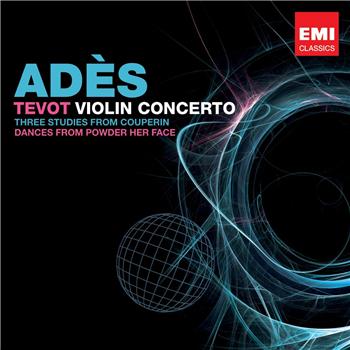 In many ways, it behooves me to include such a piece on this list. First off, wanting to include pieces of "classical" music on my list may seem a bit both short-sighted and pretentious. If its any indication of the state of classical music, even the idea that such a piece is being "released" in 2010 rather than in 2007 when it was written is reason enough to not want to deal with it. Even more, Tevot can easily be interpreted as a piece of heavy-handed modernism, just the kind of composition that will be a crowd-pleaser for its long, narrative-like structure and absurdly large orchestra requirements. Its that piece that will make classical music enthusiasts feel like they live in better artistic times, when "bigger is better" was still the rule of the land and Richard Strauss was the king. Fortunately, despite these external perceptions, Tevot is an absolutely delightful piece of mastered technique and exciting musical physicality. Thomas Ades has been in the spotlight of high culture for quite some time now as both a conductor and composer, but Tevot certainly feels like a culmination of his musical ideas and practices. The name of the composition refers to the hebrew word for "ark" or "ship", such as Noah's ark. However, in this case, Ades explains the title as referring to the earth as an ark, or a ship, carrying us through a journey of the varying tribulations of the universe. The different aspects of the journey are expressed through number of widely different textural movements. The piece begins with atmospheric brass swelling and chirping string parts written in octaves beyond the stratosphere like a titanic starship moving through fields of sparkling stars. The menacing chromaticism erupts in a variety of different musical textures including an exciting section of rhythmic hits that feel like the Rite of Spring's clumsy grandson, as well as a section towards the end that renders his themes in more contemporary minimalistic techniques.
In many ways, it behooves me to include such a piece on this list. First off, wanting to include pieces of "classical" music on my list may seem a bit both short-sighted and pretentious. If its any indication of the state of classical music, even the idea that such a piece is being "released" in 2010 rather than in 2007 when it was written is reason enough to not want to deal with it. Even more, Tevot can easily be interpreted as a piece of heavy-handed modernism, just the kind of composition that will be a crowd-pleaser for its long, narrative-like structure and absurdly large orchestra requirements. Its that piece that will make classical music enthusiasts feel like they live in better artistic times, when "bigger is better" was still the rule of the land and Richard Strauss was the king. Fortunately, despite these external perceptions, Tevot is an absolutely delightful piece of mastered technique and exciting musical physicality. Thomas Ades has been in the spotlight of high culture for quite some time now as both a conductor and composer, but Tevot certainly feels like a culmination of his musical ideas and practices. The name of the composition refers to the hebrew word for "ark" or "ship", such as Noah's ark. However, in this case, Ades explains the title as referring to the earth as an ark, or a ship, carrying us through a journey of the varying tribulations of the universe. The different aspects of the journey are expressed through number of widely different textural movements. The piece begins with atmospheric brass swelling and chirping string parts written in octaves beyond the stratosphere like a titanic starship moving through fields of sparkling stars. The menacing chromaticism erupts in a variety of different musical textures including an exciting section of rhythmic hits that feel like the Rite of Spring's clumsy grandson, as well as a section towards the end that renders his themes in more contemporary minimalistic techniques.One of the more surprising features of the piece is the way it encircles the space opera persona almost like a journey from Holst's "The Planets" to "2001: Space Odyssey" and back again. There are even moments when it feels like Ades is even directly expanding and referencing this space opera theme music, utilizing an explicit minor 7th leap that recalls the Star Trek theme music that makes him sound like Thomas Newman's artsy twin brother. At other times, he is unafraid of being utterly tonal and triumphalist in his own terms. In one the best sections of the piece, he brings those extremely high string parts down to earth to reveal their beautifully shifting and hard-to-grasp tonality. Tevot is a colossal piece that must be experienced as a whole and while its hardly revolutionary, it is always incredibly tangible and physical, creating a space opera in itself of a very different kind. While its hard to tell whether Thomas Ades' dissonant/consonant relationships and neoromanticism are moving forward in a new direction or simply updating "The Planets", its hard not to get pulled into his uncanny cultural references and sweeping cosmic grandness. The fact that Tevot manages to successfully communicate despite its overweight traditionalism is a compliment to its author's magnificent vision and the piece's unrelenting richness.
Here's a link to hear an excerpt of the 22-minute musical journey:
http://www.npr.org/player/v2/mediaPlayer.html?action=1&t=1&islist=false&id=131673326&m=126029041
(if the link isn't working, just copy and paste the link into your browser)

No comments:
Post a Comment